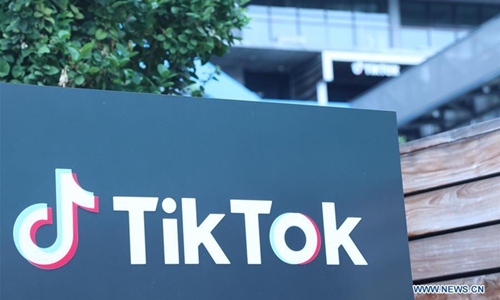ByteDance may not get Chinese approval to export tech behind TikTok: experts
By GT staff reporters Source: Global Times Published: 2020/9/24 13:47:01

Photo taken on August 21, 2020 shows a logo of the video-sharing social networking company TikTok's Los Angeles Office in Culver City, Los Angeles County, the United States. TikTok confirmed Saturday that it will file a lawsuit against the Trump administration over an executive order banning any U.S. transactions with its parent company ByteDance. (Xinhua)
Beijing-based ByteDance, owner of viral short-form video app TikTok, said it has applied for a permit with regard to the TikTok deal in the US to Beijing municipal authorities, meaning the outcome on whether China will grant such a deal will be known in 15 days. But Chinese analysts following the deal said the chance of approval is slim due to technological, legal and political reasons.ByteDance said on Thursday that it has applied for a permit from the Beijing Municipal Commerce Bureau in accordance with China's regulations on technology imports/exports and the newly updated catalogue for controlled export items, and it is waiting for the due process.
Chinese authorities are expected to provide a feedback within 15 days, according to relevant regulations.
ByteDance is in talks with the US firms Oracle and Wal-Mart to work out a deal on its US assets, after US President Donald Trump issued an executive order in attempt to force the sale of TikTok to US businesses in August. According to the executive order, downloads for the TikTok app will be banned starting from Sunday.
Separately, TikTok has filed a plea at a court in the US to suspend Trump's executive order.
However, as the final outcome of the controversial TikTok deal is beginning to be unveiled, Chinese analysts closely following the development of the matter said the chances of the Chinese government granting an approval for such a deal as slim, based on what is known publicly.
Qi Yue, a researcher with the China Cybersecurity Review Technology and Certification Center, pointed out now that ByteDance is seeking for an approval to export technologies behind the TikTok app, there is inconsistency with its previous statement which said a TikTok deal won't have anything to do with core technology.
ByteDance said on Monday that the deal would not involve the transfer of any algorithms and technology, though Oracle would have access to TikTok's source code for US users. ByteDance also insisted it will have a majority stake of 80 percent in the new subsidiary TikTok Global, but Trump said his administration would not approve such an arrangement.
However, Lu Chuanying, an associate research fellow at the Shanghai Institute for International Studies, said allowing a US firm to look at core source code will mean the irrevocable loss of China's intellectual property.
If ByteDance loses its core technology to American technology companies, it will adversely affect its business operation in China and the situation will harm China's domestic technology sector, undermining China's national security, Qi said.
The structure of the board of TikTok Global and its equity stakes are all predominantly American, and this can be problematic too, Lu said. "Despite ByteDance's statement on Monday that it will have majority stake in the new firm, it would be impossible to see how Chinese interests won't be affected under the current arrangement," Lu told the Global Times on Thursday.
Both analysts noted that the Chinese government has also to consider the flip-flop the Trump administration showed as talks for the deal progressed.
Lu said the 15-day timeframe could be extended if the Chinese authorities believe there is a need to prolong the review process, often out of national security reasons.
RELATED ARTICLES:
Posted in: COMPANIES